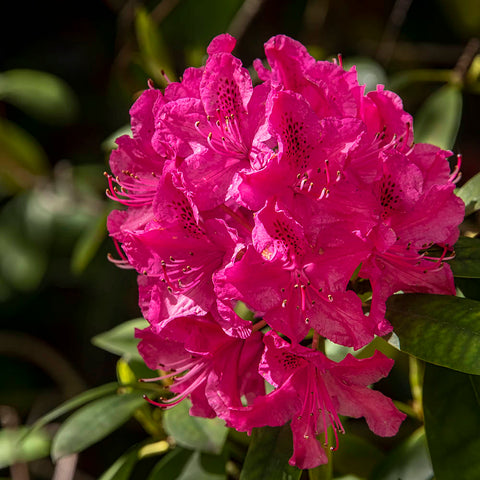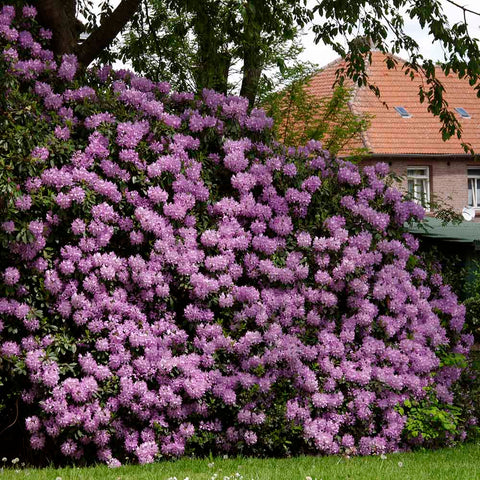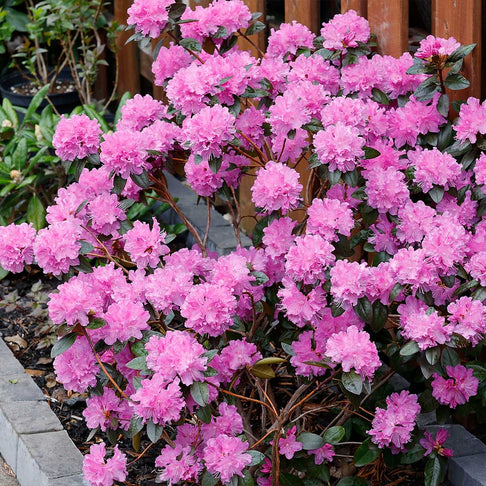Rhododendron Shrubs
Showing 1 - 11 of 11 items
Showing 11 of 11 items
Growth Rate: Moderate Growing
Starting at $31.95
Growth Rate: Moderate Growing
Starting at $36.95
Growth Rate: Moderate Growing
Starting at $29.95
Growth Rate: Moderate Growing
Starting at $28.95
Growth Rate: Moderate Growing
Starting at $120.95
Growth Rate: Moderate Growing
Starting at $47.95
Growth Rate: Moderate Growing
Sold Out
Growth Rate: Slow Growing
Starting at $35.95
Growth Rate: Moderate Growing
Sold Out
Growth Rate: Moderate Growing
Sold Out

Selecting and Planting Rhododendron Bushes
It's the plant that come to mind when you think of classic blooms without the work.
Rhododendron bushes make an effortless, unmatched statement. And though the best variety will depend on your growing zone and conditions, Rhododendrons are well-suited to almost any garden.
Rhododendrons are a popular floral accent that will enhance any landscape, garden, or patio. With attractive blossoms and evergreen foliage to match every season, you’ll love these low-maintenance showstoppers year after year.
They're closely linked to the equally popular Azalea - in fact, all Azaleas are a type of Rhododendron! The main differences? Rhododendrons are primarily evergreen, with bell-shaped, clustered flowers.
The Ultimate Accent
Rhododendrons are often implemented as bushes, or pruned into small trees. The Rhododendron's main attraction are the bell-shaped blooms that show up from spring until fall, in hues of red, pink, purple, yellow and beyond.
And even the evergreen foliage is lush and pleasant, providing a rich green backdrop for the cheerful flowers. This charm is often utilized in low hedge walls, as walkway accents, or even potted around porches and entryways. And since the Rhododendron comes in so many sizes and colors, it's not uncommon to mix and match.
Rhododendrons also grow in a range of sizes, making it easy to incorporate into your landscape. Full-size rhododendrons can grow quite large - some even up to 20 feet tall. If you're looking for a more compact rhododendron for a small garden area, a dwarf rhododendron is the perfect choice - you can find them as small as 16 inches at maturity!

Choosing the Right Rhododendron For You
With a multitude of varieties, these classic blooms could be just the thing your landscape needs. And while they are lower-maintenance than many other flowering shrubs, each variety should be planted in its ideal zone and location.
Some popular varieties include:
White Rhododendron: A snowy, feminine bloom with daintily formed petals.
Red Rhododendron: A blushing, crimson flower with small, coned blooms and protruding center growth.
Lavender Rhododendron: Delicate flowers form a cascade of lavender color.
Yellow Rhododendron: Sunny-yellow blooms brighten the landscape, with admirable heat tolerance.
Some Rhododendron varieties do best in growing zones 6-9, covering the southern half of the United States. Others will fare better in the mid- to northern regions of the United States, including growing zones 4-8.
There are over 900 species in the Rhododendron family, so explore the best options according to the region you live in. And don't forget to consider the size of your planting area - while traditional rhododendrons can work well in larger landscape spaces, consider a dwarf rhododendron for smaller areas.

How To Help Your Rhododendron Flourish
Although Rhododendrons are low-maintenance, that doesn't mean no maintenance, so keep these tips for Rhododendron care in mind.
When selecting your planting location, find a spot with full to partial sun (6-8 hours of sunlight daily). For potted Rhododendrons, opt for at least a 3-gallon pot, so your Rhododendron has room to grow. If you do plan to incorporate your Rhododendron into a border or hedge, space them anywhere from 2 to 6 feet apart.
Rhododendrons prefer soil that is well-draining, acidic and rich in organic matter, to promote better blooming. They are admirably drought-tolerant once established and can typically survive on rainfall alone, but be sure to water young plants regularly - once or twice a week, or when the soil is dry 2-3 inches down.
Any pruning should take place after spring flowering occurs. Throughout the year, you can remove dead branches or growths as needed.
Although Rhododendrons are easy-growing, they can be susceptible to some pests, including weevils and caterpillars. Defenses such as sticky barriers around the base, or gentle, organic horticultural sprays will often prove helpful and effective.
And these flowers are pollinators, so expect bees, birds and butterflies to find their way to your garden!
Shrubs You'll Enjoy for Seasons to Come
Annual flowers, classic evergreen foliage, and easy maintenance make the Rhododendron family one you’ll love incorporating into your landscape. Check your growing zone and find the perfect Rhododendron bush to fit your home today!











